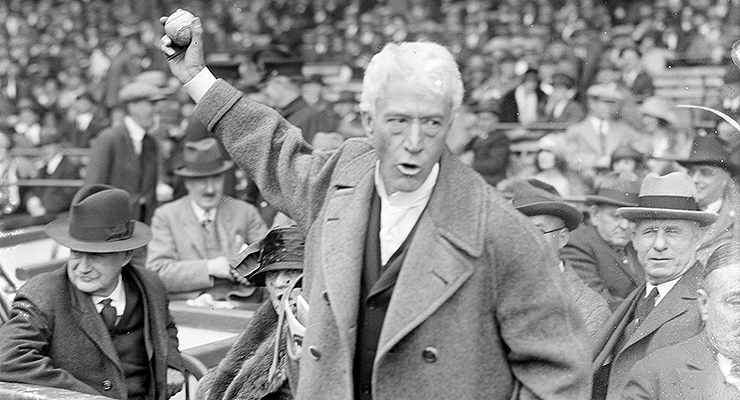A few weeks back I sat down and was searching for something to watch while I ate dinner in my tiny apartment. During my browsing, I came across 2016’s Jackie Robinson and realized that somehow I had never gotten around to the documentary. Ken Burns’ Baseball has been a staple in my life for many years. I recall being jazzed for him to team up with Sarah Burns and David McMahon to present a more detailed look at Jackie Robinson. Life got in the way and I never got around to Mr. Burns’ film. A lazy Tuesday night seemed like a great opportunity to press play and hopefully be transported into the life of the former Brooklyn Dodgers superstar.
Jackie Robinson was, to put it simply, what one should expect from a Ken Burns documentary; A little formal, light on facts in some places, but an engrossing experience that engages the viewer on a deep level. Jackie Robinson earned a place right next to Baseball as the only documentaries about the game I love that I see as required viewing. After watching the film and giving it some critical thought, I did what I am wont to do, and looked up some reviews. Scattered among the handful of reviews I read there was one prevailing thought that spoke to me; that thought pertained to a man not named Jackie Robinson, but rather Kenesaw Mountain Landis.
I’m sure most reading this are well aware of the name Kenesaw Mountain Landis. For those unaware, Landis is famous for being the first Commissioner of Major League Baseball. He was a federal judge brought on board in 1920 to replace the relatively ineffective National Commission that had previously overseen MLB operations. He served as Commissioner until his death in 1944. His notoriety mostly stemmed from his handling of the 1919 Black Sox Scandal. A lot has been written about that scandal, with much more detail than I could hope to include in this article. The short version is that eight members of the Chicago White Sox had been accused of taking money from gambling interests to throw games in the 1919 World Series. Landis came down hard on those eight men, banning them from MLB for life.
Through his handling of that one scandal, Landis became known as the iron-fisted Commissioner of MLB. Coupled with his tenure as a federal judge, Landis had a reputation above all others. He helped to reframe the way MLB was viewed by the
The film Jackie Robinson, and the subsequent reviews I mentioned come into play when we discuss the topic of MLB and its issues with integration. The topic of integration in MLB, and by extension Minor League Baseball, is well documented and has been explored by far better writers than I. However, one of the criticisms levied against Jackie Robinson does merit some exploring, that the film greatly overplayed Landis’ opposition to integration. Said criticism turned into a defense of Landis’ character, a defense that is unwarranted and misguided.
The main argument put forth by those supporting Landis is that he never actually voiced opposition to integration. This is by and large the truth, but it belies another truth. Actions or words are good indicators of opposition. John Stuart Mill once said, “A person may cause evil to others not only by his actions but by his inaction, and in either case, he is justly accountable to them for the injury.” Landis chose to be silent, he chose to inflict injury upon Negro ballplayers. Landis could have done the right thing, the honorable thing, but he chose an evil path instead.
While it is true that no credible research has uncovered any evidence of words or actions of Landis’ that were in opposition to integration, it is also true that silence is a form of action, and inaction is yet another form of action. This is the truth that those defending Landis do not want to recognize. Perhaps it comes from white guilt (all those defending Landis were of the white persuasion). It could be that those defending Landis don’t see his silence and inaction as equatable with actual opposition to integration. There are lots of possible reasons why people continue to fight for Landis and against those who want to hold him accountable for MLB’s, and MiLB’s, refusal to integrate.
Landis was once quoted as saying that the issue of integration was not an MLB issue, but rather a club issue. This feigned deference to the authority of the club owners speaks volumes about the man Landis was and how his legacy should be viewed. Even in speaking on the issue he chose to remain outwardly silent. I say outwardly because in reality what Landis was doing was daring any of the owners to go against the status quo. By daring them to go against the status quo he had gladly upheld for years he was asking them to go against him and his reputation. There isn’t a person alive who could convince me that Landis wasn’t daring the owners to do this because he knew they wouldn’t and thus he knew that segregation would stay in place. He hedged a bet on his power allowing a racist policy to stay in place and yet again he used the inaction of his office to show that he was behind said racist policy. Those who use this to defend Landis are using a surface action to hide the reality that is underneath.
To those defending Landis, I say this; you are wrong. You’re not just wrong, you are celebrating historically racist actions under the guise of good behavior. The silence displayed by Landis towards minority baseball players was deafening. His inaction on the topic of integration provided all the encouragement more visible integration opposers needed to remain steadfast in their efforts. By choosing silence and inactivity Landis sent out the clarion call that integration need not happen and that the practice of segregation was for everyone’s benefit. More than that, Landis’ lack of action was built on the idea that he was beyond reproach. His silence created an environment where the topic of integration couldn’t be seriously broached because to do so would be an assault upon Landis’ indisputable reputation.
Those defending Landis want the world to be seen through the lens of history as it has been taught, not as it actually occurred. We have been taught that Landis is the gold standard among MLB Commissioners, and similarly, we have been taught that Landis was a shining beacon of truth and justice. He was seen that way by white owners who knew that his silence meant they could continue to exclude black ballplayers with impunity. The truth and justice Landis delivered was the truth and justice of the status quo. He is a hero to baseball for allowing racists to remain racist and keeping the league the color it was intended to be; white.
The above may seem harsh, but it is the reality of the man Kenesaw Mountain Landis chose to be during his time as MLB Commissioner. He deserves no fanfare, no exultation, and no adulation. The defenses in his name are laughable at best. At worst they are attempts to allow Landis’ racism to continue unbridled, years after his death. The question then becomes, is there any way to hold Landis accountable for his silence and inaction? There is, but it is not an action that people will welcome with open arms.
The main action that could be taken against Landis is to look at the way he handled the 1919 Black Sox Scandal. He banned those players for life because he believed their actions harmed the game an untold amount. In his own words,
Regardless of the verdict of juries, no player that throws a ball game, no player that entertains proposals or promises to throw a game, no player that sits in a conference with a bunch of crooked players and gamblers where the ways and means of throwing games are discussed, and does not promptly tell his club about it, will ever again play professional baseball.
He went against what a grand jury had decided and used his power as Commissioner to enact a punishment that he believed was needed to protect the league.
I think it is without question that Landis’ actions are even worse than those of the 1919 Chicago White Sox players. Yet, he has a place of prestige in Cooperstown while the White Sox players have been relegated to stories of lore. They possibly threw baseball games in order to make more money. Landis used his inaction and silence to keep an entire race of people from being allowed to play the national pastime with white ballplayers. He deprived baseball fans of the chance to witness Bullet Rogan, Nip Winters, Josh Gibson, and Cool Papa Bell on a more national stage. His silent racism has made it where the accomplishments of Ted Williams, Stan Musial, Hack Wilson, Walter Johnson, Chuck Klein, and Lefty Ford have to be held to a different level of scrutiny because they were not playing against the very best competition possible. Landis’ actions harmed baseball to a scope that is nearly unheard of, and he did so for decades through simple silence.
The solution then is to ban Landis from MLB, remove him from the National Baseball Hall of Fame, and make sure that all are aware of the role his silence played in hurting the game of baseball. This may seem like a drastic measure, but if the league truly cares about integrity and the legacy it continues to build, then banning Landis is a necessary action. There’s no place in an institution dedicated to the celebration of baseball for a man who spent his life silently yet obviously working against the best interests of baseball and towards the continuation of an informal racist agreement.
Landis is a stain upon MLB and the game of baseball. A stain that it is high time MLB took the needed actions to remove. I am under no delusions that this will ever happen, or that Landis’ defenders will ever own up to the truth of the man they are upholding. I am one person shouting into the wind about an issue that is nonexistent to most. Landis is in the National Baseball Hall of Fame; though he does not belong there, he will always be in that revered home for baseball greats. It’s a shame that is the case because every day that Landis’ memory spends in Cooperstown, it sullies the place for all those who truly do deserve to call it home.
Lead photo courtesy of Bain News Service





I haven’t seen the Burns documentary on Jackie Robinson, but I’ve read Robinson’s autobiography “I Never Had it Made.” One of the best baseball autobiographies I’ve read, and I’ve read a lot of baseball biographies. Robinson was sort of like a black Forest Gump, with his finger in just about all the most important social trends going in America between 1941 and his death in 1972. Only Robinson was intelligent and had strong opinions about what he was living through.
Robinson was very politically active, though I don’t find myself always agreeing with his politics. Still, that he was involved as much as he was is a good thing and something that other athletes should try to emulate.